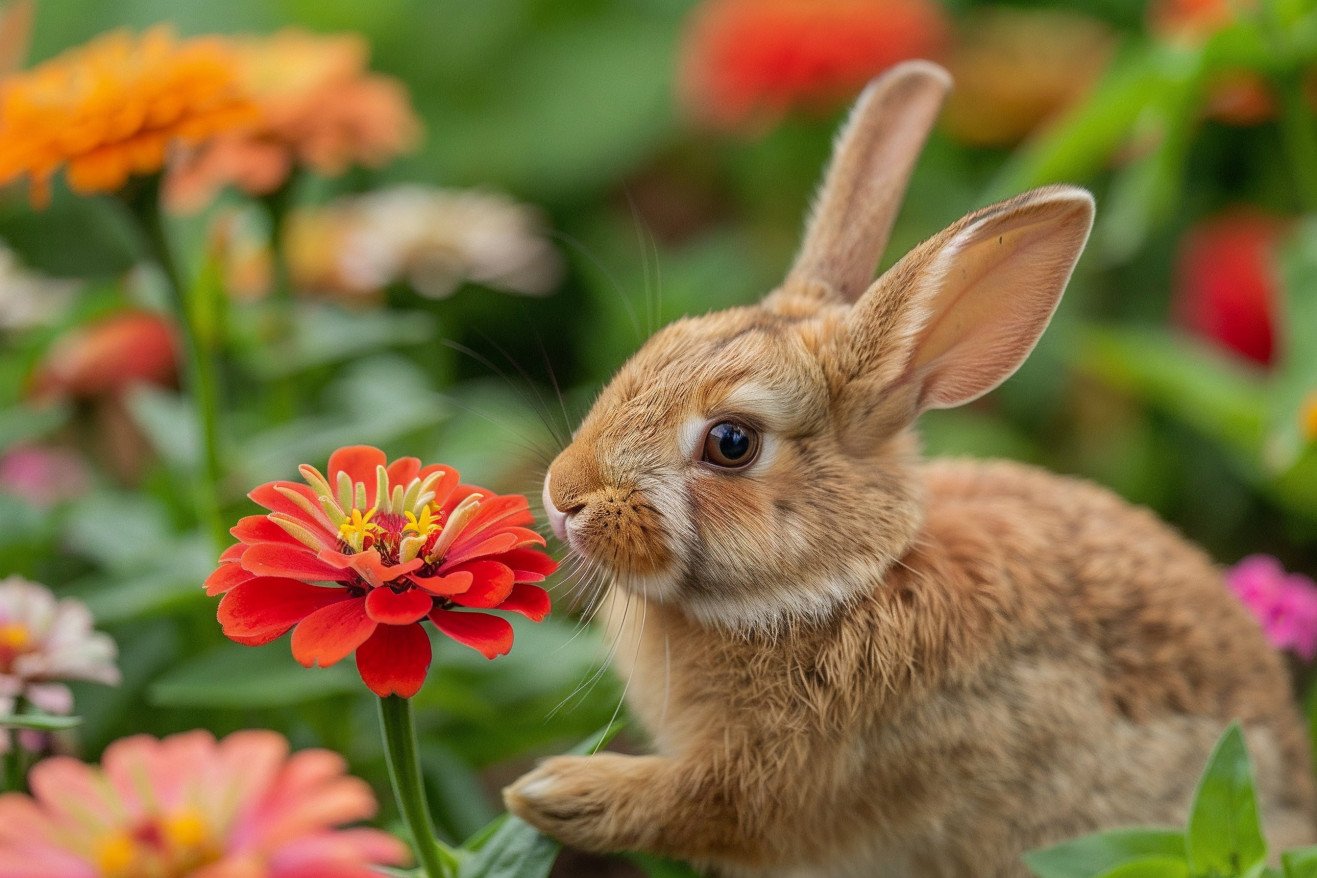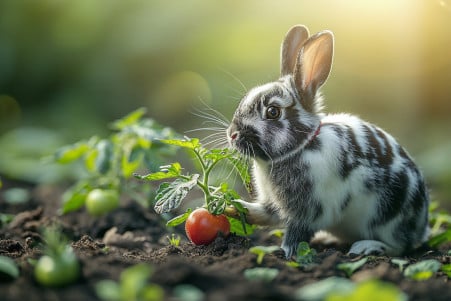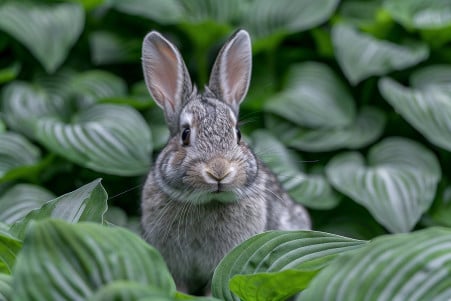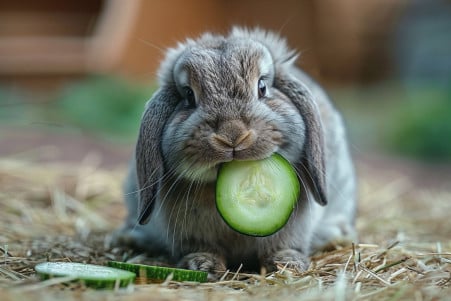Can Rabbits Eat Zinnias? Exploring Floral Feeding
13 May 2024 • Updated 13 May 2024

Even if you're growing them in your garden, you may find yourself wondering if rabbits can eat zinnias. Unfortunately, rabbits should not eat zinnias because they are toxic to rabbits and can cause a range of symptoms from mild digestive upset and lethargy to liver damage. Instead, you should feed your rabbit safe greens like romaine lettuce, fresh herbs, and carrot tops.
To fully understand the dangers and considerations of rabbits and zinnia plants, we will explore the findings of veterinary toxicologists and rabbit behaviorists. By combining the information from these two bodies of research, we can better understand the potential risks of zinnias to rabbits and how you can ensure that your pet rabbit has a safe and enriching living environment. This way, you can feel confident that you are providing your floppy-eared friend with the best care possible.
Can rabbits eat zinnias?
Companion Planting: A Natural Defense for Zinnias
If you're worried about rabbits eating your zinnias, you can use companion planting to your advantage. By planting certain companion plants near your zinnias, you can create a natural barrier that rabbits won't want to cross. According to Garden Collage Magazine, rabbits are repelled by plants with strong smells or textures that are prickly and uncomfortable. Marigolds, lavender, and herbs like sage and rosemary are all known for their strong scents, which can help keep rabbits at bay. Meanwhile, snapdragons and ornamental sages have hairy leaves that rabbits don't like.
The Denver Post backs this up, explaining that rabbits are often repelled by "plants with a strong scent, especially those that have an earthy, herbaceous aroma." By planting these rabbit-resistant plants near your zinnias, you can create a protective barrier that will keep your zinnias safe.
However, it's important to make sure you're planting your companion plants in the right place. According to Minnesota's horticulture experts, you should plant plants like zinnias that are susceptible to rabbits near a "buffet" of rabbit-attracting plants that will draw the rabbits away. By doing this, you can use companion planting to outsmart the rabbits and keep your zinnias safe and sound. And if you want to make sure your zinnias are as safe as possible, you can also use companion planting to choose the best zinnia varieties.
Zinnia Varieties and Rabbit-Resistant Growing Practices
Some zinnia varieties may be less appealing to rabbits than others. For example, the North Carolina Extension Gardener Plant Toolbox notes that the 'Profusion' series of zinnias is valued for its tough foliage that is resistant to insects and potentially rabbits. This hybrid of Zinnia angustifolia and Zinnia elegans takes the best of both species, including drought, heat, and humidity tolerance.
In addition, certain growing practices can help ensure that your zinnias are as healthy and robust as possible, which can make them less attractive to rabbits. Gardener's Path explains that zinnias need well-draining soil and plenty of space to grow. Moreover, if you choose a variety of zinnia that has a compact, mounding shape, rabbits may have a harder time reaching the plants. By making sure that your zinnias are well-cared for, you can make them stronger and more resistant to rabbit damage.
By choosing the right zinnia varieties and growing practices, you can have a beautiful garden that rabbits are less likely to eat. However, there's another option that may be even more effective for protecting your zinnias from rabbits, and that's growing them in containers, which we'll discuss next.
Growing Zinnias in Containers to Deter Rabbits
One way to grow zinnias and protect them from rabbits is to grow them in containers. According to Gardener's Path, growing zinnias in containers can work because the containers elevate the plants, which can deter rabbits that are used to feeding on plants at ground level. In addition, you can plant other rabbit-resistant plants in the same container to help keep the rabbits away. The article suggests that you look for "plants with a strong scent, especially those that have an earthy, herbaceous aroma" such as marigolds, lavender, and herbs.
It's important to choose the right containers, and according to Gardener's Path, you should look for containers that are at least 8-12 inches in diameter to ensure that the zinnias have enough room to grow. You'll also need to make sure that the containers have good drainage and that you water and fertilize your zinnias regularly to make sure that they grow well. If you can meet these requirements, you should be able to grow healthy zinnias in containers that rabbits won't bother.
Although containers can help, deer are another potential problem for zinnias in the garden. To help protect your zinnias, you can also plant deer-resistant companion plants.
Deer-Resistant Companion Plants for Zinnias
Deer are another common threat to zinnias in the garden. According to Shiplap and Shells, zinnias are deer-resistant flowers because their "strong odor" and "thick leaf texture" make them unattractive to deer. To help keep deer away from zinnias, gardeners can plant other deer-resistant companion plants.
Deer are known to avoid plants with strong odors, prickly textures, and bitter tastes, according to The Almanac. Some deer-resistant plants that can be planted alongside zinnias include salvia, snapdragons, lantana, and cleome. Stacy Ling also suggests planting lavender, nepeta, Russian sage, and globe thistle with zinnias to keep deer away.
By using a combination of deer-repelling methods, such as companion planting and repellents, gardeners can ensure that zinnias are well-protected. While companion plants can act as a natural deterrent, other methods, such as physical barriers and repellents, can be used in conjunction with companion planting to ensure that zinnias are fully protected, as we'll discuss next.
Physical Barriers and Repellents to Protect Zinnias
In addition to companion planting, physical barriers and repellents can be effective in keeping rabbits and deer away from zinnias. As explained by Garden Collage Magazine, fencing or netting that is buried a few inches below the ground and extends above the ground can be used to create a physical barrier around the garden. The article suggests using chicken wire or mesh fencing with a 1-foot underground and 1-foot aboveground "L" shape to prevent rabbits from digging under.
Topical repellents that contain strong odors or tastes like garlic, onion, or red pepper can also be used to repel rabbits and deer, according to Bonnie Plants. However, the article explains that the chemical thiram, which is an effective rabbit repellent for non-edible plants, is poisonous to people and can't be used on edible plants. It's also important to note that these repellents need to be reapplied regularly, especially after rain or when new growth appears, to ensure that they continue to work.
Gardeners can use a combination of these methods, such as fencing, repellents, and companion planting, to offer their zinnias the most protection. This comprehensive approach can help guarantee that zinnia gardens are successful and safe from rabbits and deer.
Conclusion: How to Plant a Rabbit- and Deer-Proof Zinnia Garden
To keep zinnias safe from rabbits and deer, you'll need to take a multi-faceted approach. Companion planting with rabbit- and deer-resistant varieties will help create a natural barrier that deters the animals.
Proper zinnia care and selecting resilient varieties can make the plants less appealing to pests. Physical barriers and repellents can provide additional protection when used consistently. By combining these strategies, gardeners can enjoy vibrant, healthy zinnia blooms without worrying about rabbit or deer damage.


